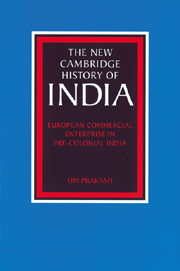Book contents
- Frontmatter
- Dedication
- Contents
- List of figures
- List of maps
- List of tables
- General editor's preface
- Preface
- Introduction
- 1 India in the Indian Ocean trade, circa 1500
- 2 The Portuguese in India, 1500–1640
- 3 The European trading companies: exports from Europe and the generation of purchasing power in Asia
- 4 The companies in India: the politics and the economics of trade
- 5 Euro-Asian and intra-Asian trade: the phase of Dutch domination, 1600–1680
- 6 The VOC and the growing competition by the English and the French, 1680–1740
- 7 The supremacy of the English East India Company, 1740–1800
- 8 European trade and the Indian economy
- 9 Conclusion
- Bibliographic Essay
- Index
- Misc-endmatter
- Map 1 Important trading centres in Asia in the seventeenth and eighteenth centuries"
- Map 2 Portuguese seaborne empire, c. 1580"
- Map 3 The Indian Ocean in the seventeenth and eighteenth centuries, showing the settlements of the English East India Company and of other European nations"
- Map 4 India: main textile–weaving areas, 1600–1750"
- References
9 - Conclusion
Published online by Cambridge University Press: 28 March 2008
- Frontmatter
- Dedication
- Contents
- List of figures
- List of maps
- List of tables
- General editor's preface
- Preface
- Introduction
- 1 India in the Indian Ocean trade, circa 1500
- 2 The Portuguese in India, 1500–1640
- 3 The European trading companies: exports from Europe and the generation of purchasing power in Asia
- 4 The companies in India: the politics and the economics of trade
- 5 Euro-Asian and intra-Asian trade: the phase of Dutch domination, 1600–1680
- 6 The VOC and the growing competition by the English and the French, 1680–1740
- 7 The supremacy of the English East India Company, 1740–1800
- 8 European trade and the Indian economy
- 9 Conclusion
- Bibliographic Essay
- Index
- Misc-endmatter
- Map 1 Important trading centres in Asia in the seventeenth and eighteenth centuries"
- Map 2 Portuguese seaborne empire, c. 1580"
- Map 3 The Indian Ocean in the seventeenth and eighteenth centuries, showing the settlements of the English East India Company and of other European nations"
- Map 4 India: main textile–weaving areas, 1600–1750"
- References
Summary
One of the principal outcomes of the great discoveries of the closing years of the fifteenth century was the rise of a pre-modern world economy. It was the almost simultaneous discovery of the Americas and of the all-water route to the East Indies via the Cape of Good Hope that had brought the three potential constituent segments of this economy, namely Europe, the New World and Asia, together for the first time. By providing a wide range of goods for both Europe and the New World, and by absorbing in return an important segment of the New World output of silver, Asia played a key role in the creation and the subsequent successful functioning of this global network of exchange. The nature of the relationship between Europe and Asia during this early period was essentially one of mutual advantage with each side perfectly capable of a market-determined response structure and rational process of decision making.
The principal agencies instrumental in the running of the Euro-Asian commercial network in the early modern period were the European corporate enterprises – the Portuguese Estado da India in the sixteenth, and the Dutch, the English and the French East India companies in the seventeenth and the eighteenth centuries. A certain amount of Euro-Asian trade was also carried on by private European traders, though it would seem to have been quantitatively significant only in the case of the Portuguese private traders. Traditionally, pepper and other spices such as cloves, nutmeg and mace had accounted for an overwhelming proportion of the total Asian imports into Europe.
Keywords
- Type
- Chapter
- Information
- European Commercial Enterprise in Pre-Colonial India , pp. 337 - 351Publisher: Cambridge University PressPrint publication year: 1998



